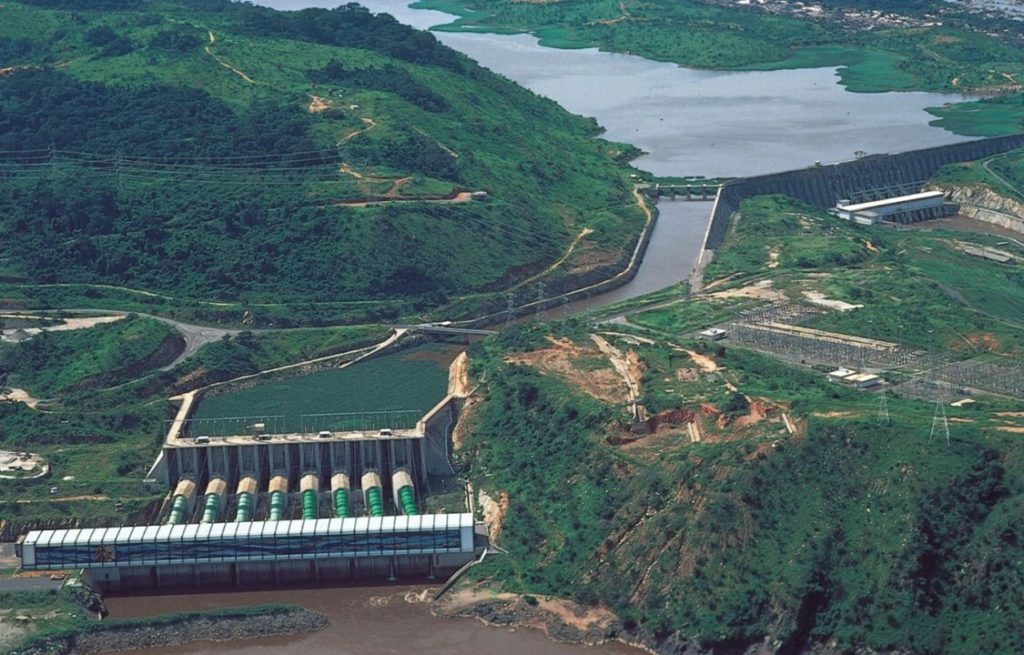Bloomberg News | May 22, 2024 |

Inga Dam. Image source: Britannica
A company owned by Australian mining billionaire Andrew Forrest will no longer develop the world’s biggest hydropower project in Democratic Republic of Congo, according to President Felix Tshisekedi’s office, which has replaced the firm with a Nigerian oil producer.

Natural Oilfield Services Ltd. signed a preliminary deal with Congo on May 9 to build a smaller version of Fortescue Ltd.’s proposed Grand Inga project, which would have generated around 40 gigawatts of hydropower.
The Lagos-based company has agreed to undertake feasibility studies for a 7-gigawatt facility on the Congo River, according to a statement from the presidential agency overseeing Inga’s development. The revised proposal – concluded at a ceremony in the capital, Kinshasa – includes the construction of an aluminum foundry and a refinery capable of processing 4 million tons and 8 million tons each year, respectively.
Natural Oilfield’s Indian owners have been accused by the authorities in New Delhi of absconding after defrauding public banks of about $1.7 billion. The company and a lawyer representing its founders didn’t respond to requests for comment.
If built to full capacity, Grand Inga would supplant the Three Gorges Dam as the world’s biggest source of hydropower. It’s long faced headwinds because of Congo’s history of corruption and the expected cost of the multiphase project – with some estimates topping $80 billion.
There are already two dams at the Inga site with about 1.8 gigawatts of installed capacity that were built more than 40 years ago. Most of that electricity is transmitted 1,000 miles across the country to power Congo’s copper and cobalt mines, which are run by the likes of CMOC Ltd., China Railway Group Ltd. and Glencore Plc.
Fortescue itself replaced a consortium of Spanish and Chinese companies, which failed to develop a $14 billion, 11-gigawatt version of the project known as Inga III.
Fortescue will no longer participate in the revised Inga plan, Congo’s presidency told Bloomberg.
“We have not been notified of any change to the deed of agreement we have in place with the DRC government, or about any other agreements that have been signed with other parties,” a spokesperson for Forrest’s firm said in an emailed response to questions on Thursday. “Fortescue remains open to continuing discussions about our future in the DRC.”
The Australian company planned to develop a green hydrogen project using Inga’s power. The webpage for the project is no longer operational.
Natural Oilfield is a subsidiary of Sterling Oil Exploration & Production Co., which pumps more crude in Nigeria than any company other than multinational giants like Shell Plc, Exxon Mobil Corp. and Chevron Corp. Sterling currently produces about 70,000 barrels per day, while Natural Oilfield this month commissioned a new oil block in the West African country, where it’s targeting an additional 40,000 barrels a day.
India’s top investigating agency charged Sterling’s founders – Nitin and Chetan Sandesara – in late 2019. The Central Bureau of Investigation has told the country’s Supreme Court that the brothers conducted a “well-calculated economic fraud” that left their Mumbai-headquartered conglomerate owing more than 140 billion rupees ($1.7 billion) to public lenders.
In a complaint, India’s Enforcement Directorate – another federal investigative agency – alleged that 60% of about $900 million raised between 2004 and 2013 for the Sandesaras’ Indian companies “was diverted and ultimately laundered” before being “taken to Nigeria to fund their oil business.” The brothers were declared fugitives by an Indian court almost four years ago.
The brothers deny cheating their banks and want to reach a financial settlement with creditors, according to filings they submitted to India’s Supreme Court.
Congo’s Inga agency did not respond to questions about the allegations against Natural Oilfield’s founders.
(By Michael J. Kavanagh and William Clowes)
No comments:
Post a Comment